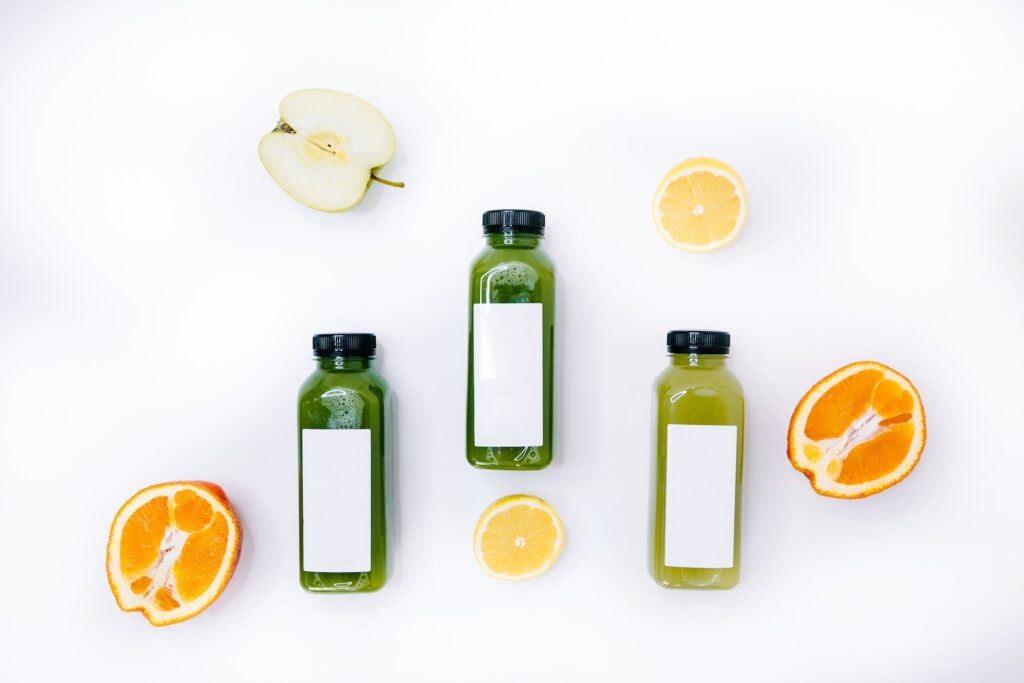
The hallmark of most “cleanses” or “detoxes” out there is…restriction. Juice cleansing, where you drink nothing but juice, fits perfectly into this.
Although the word “detox” has been co-opted in many cases simply to sell ways of dieting, your body actually does have very real detoxification pathways. Ironically, these pathways actually need MORE nutrients to run effectively, not less.
That’s why, if one is truly concerned about supercharging their body’s detox capacity, a balanced and expansive way of eating is most helpful.
A Quick Primer on Detoxification
Detoxification happens primarily in the liver, but many other organs are involved as well, including your kidneys, lungs, skin, and gut! Issues with any of these “organs of elimination” can put a damper on detoxification, especially the gut.
Poor gut health hinders proper detoxification for a few main reasons.
First, too much “bad” bacteria or fungi can release their own toxins, increasing total toxic burden. Secondly, if the gut lining is permeable (called “leaky gut”) and/or the immune system in our gut isn’t robust, it cannot act as a barrier and allows more toxins to enter the body. Finally, if your digestion is sluggish and trends toward constipation, you won’t be able to eliminate all that junk.
Beyond issues with our organs of elimination, detoxification can also get bogged down by drugs, alcohol, and exposure to chemical pollutants via food (think pesticides), water, or air.
Why I’m not a fan of juice cleanses
Contrary to popular belief, juice cleanses are not the best way to support detoxification. In some cases, they can do more harm than good. Here are 5 reasons why:
There’s no fat to absorb fat-soluble vitamins
Vitamins A, D, E, and K are fat-soluble, meaning they must buddy up with some kind of fat in your digestive tract to be absorbed. Otherwise, they cannot access the rest of our body.
For example, that Vitamin K from all those lovely greens in your juice isn’t going to go far without fat. And then there’s the beta-carotene (a form of Vitamin A) in vegetables like carrots. Although beta-carotene has amazing antioxidant properties, it’s going to have a muted effect without a little fat to chaperone it into the body.
There’s virtually no protein
Amino acids, the building blocks of proteins, are needed in specific elimination pathways. Basically, the amino acids get tagged to toxic compounds so that your body is able to actually remove them (think of them like hashtags). In the absence of protein-rich foods, such as with a juice cleanse, this arm of detoxification is unable to run.
Moreover, several arms of detoxification require B vitamins and zinc. Both of these exist in ample amounts in protein-rich foods, but they can be difficult to get enough of in fruit and veggies alone.
It can exacerbate blood sugar and cortisol issues
Juice is juice, meaning it no longer contains fiber (see more on this below). Fiber, along with fat and protein, helps regulate blood sugar. That means, the sugars in a juice can hit you quickly and crash just as fast.
These peaks and valleys in blood sugar then trigger our major stress hormone, cortisol, to be released. High cortisol causes a myriad of issues, but in terms of the gut, it can slow down bowel movements causing constipation and bloating.
Juice is stripped of fiber
Fiber has many wonderful qualities beyond regulating our blood sugar. Most importantly, it is food for our gut bacteria; they literally starve without it.
When our gut bacteria don’t have anything to eat, they are not able to make the many byproducts that benefit our health, such as short chain fatty acids. Short chain fatty acids are highly anti-inflammatory both in the gut and the rest of the body, and may be protective against diseases such as diabetes, heart disease, and colon cancer.
It may slow down your bowel movements
Without any bulk from fiber, many people get constipated. If you want to detox, having a daily bowel movement is CRITICAL. After our liver does its work, we are counting on our gut to actually eliminate that crap! If a juice cleanse backs you up, toxins (and used-up hormones) are reabsorbed.
Whether it be a juice cleanse, keto, or whatever else, if it’s constipating you, it’s actual working against your detoxification process.
In conclusion
While some juices can offer concentrated phytonutrients, there’s no need to exclude all other forms of food. You can have your juice and eat too. Or just eat the tried and true whole food. For nutrient-dense, anti-inflammatory, and gut-friendly recipes, check out my Gluten-Free Recipes for Gut Health guide.
The hype around juice cleanses peaks in January, so I wanted to share these considerations for anyone contemplating one. More effective than juicing is to move towards nourishing diet and lifestyle habits that you can do on a CONSISTENT basis. Juicing is not something that can or should be done long-term. Therefore, working on the stuff that’s going to continue through the rest of the year is going to be more impactful.
Speaking of the new year, I hope you all have a happy, healthy, and delicious 2022!
